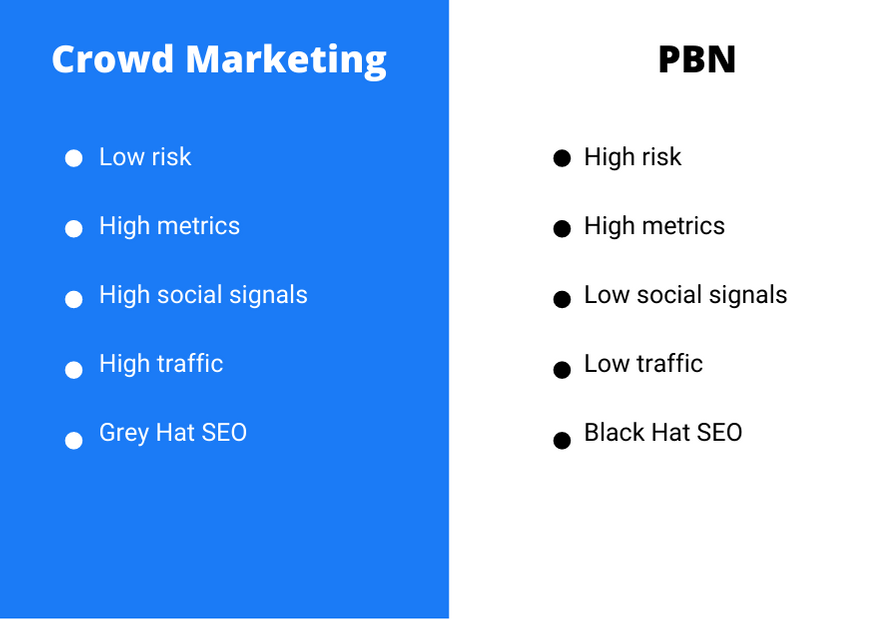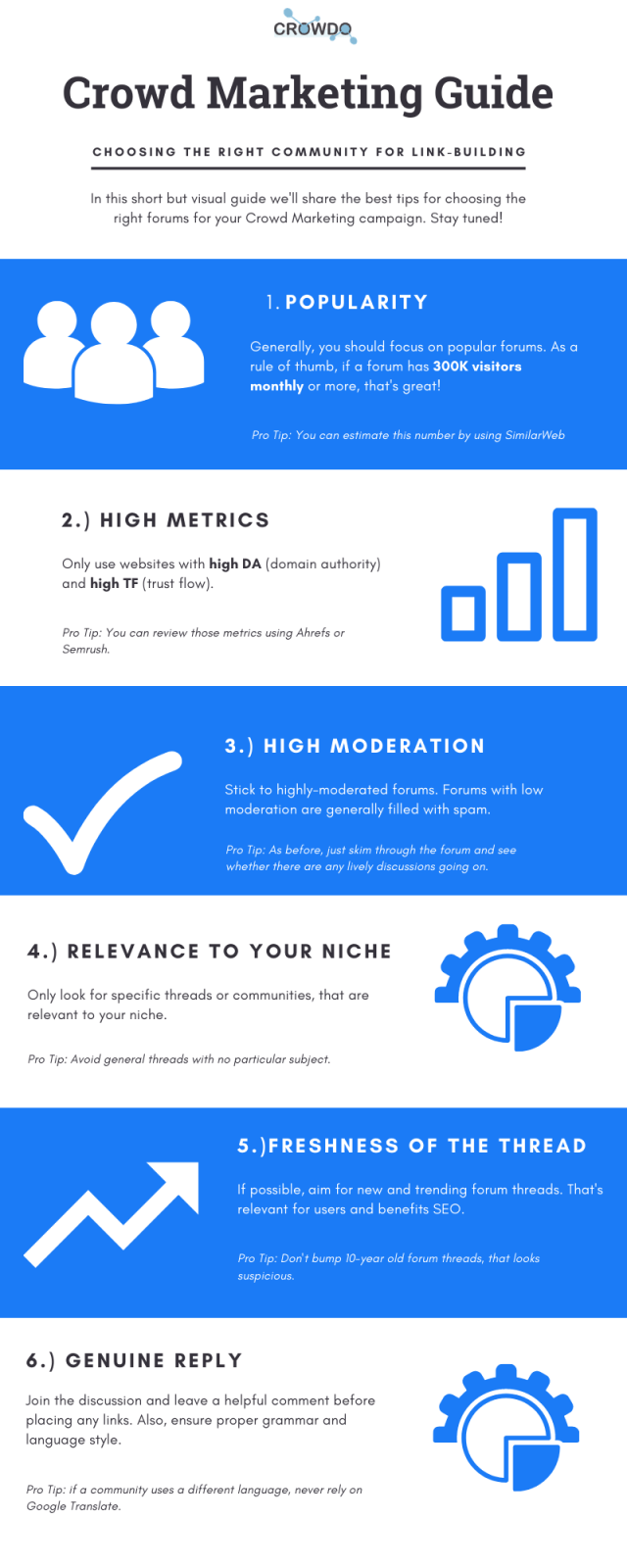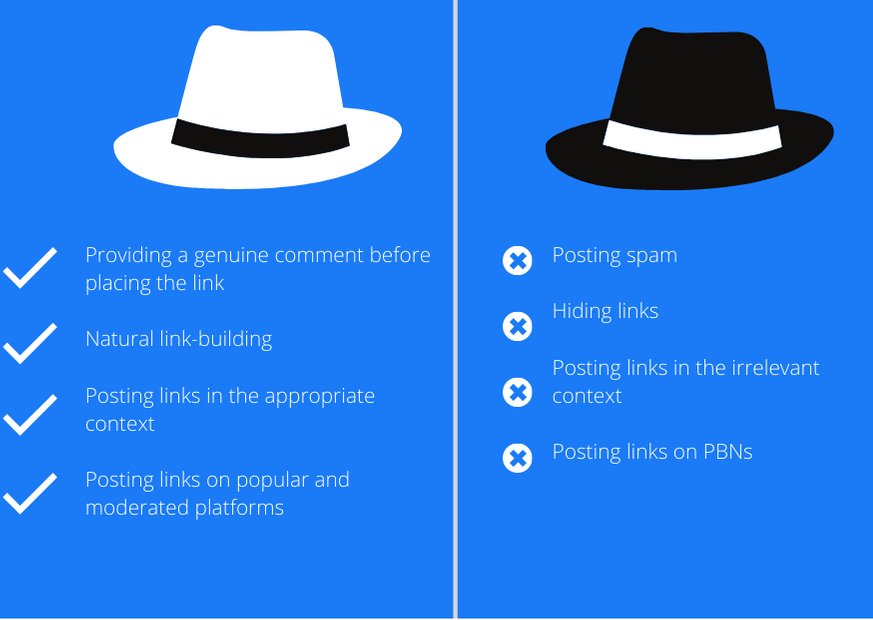Today we’re going to look at one of the most effective backlink building strategies out there! Stay tuned, as you’re about learn everything you need to know about Crowd Marketing.
What is Crowd Marketing?
Crowd Marketing (also called community or forum marketing) is an ambiguous term, that can mean several different things, depending on your interpretation (or imagination).
In our case, crowd marketing is a form of link-building strategy, where the backlink to your website (along with a real-life reply) is posted in online communities (that’s where word crowd comes from).
This provides a tremendous SEO boost, as Google loves when people reference a certain website – it makes it look reliable and trustworthy, which in turn gets you your higher SERP ranking.
Why Would You Use Crowd Marketing for SEO?
Crowd marketing has been out there for more than a decade, yet it is still underestimated.
That’s not a bad thing, because this means that most of your competitors are probably not doing it, and you can become the first mover and rank highest in your niche.
Here are some of the main benefits you can expect from a successful crowd marketing campaign:
- A strong backlink profile
- Higher ranking in Google Search
- Increased traffic to your website
- Potentially, a boost in sales
- Increased brand awareness and exposure of your product/service
- Increased trust in your brand, thanks to a dozen of new reviews
Does Forum Marketing Bring Traffic/ Sales?
Short answer – yes it does! Just take a look at some of our own case studies. Every single client we had so far reported that his website started to rank higher on Google.
And more than 70% of clients write reviews and provide screenshots, where you can clearly see that since we started our crowd marketing campaign, their traffic has also increased significantly.
Although forum marketing does not guarantee sales per se, it is very often the case. As mentioned, your website is shown in an appropriate context, so a lot of people will check it out and purchase from you.
Here we’re talking about direct sales, but what if we tell you, that crowd marketing can also bring you lots of sales indirectly?
Let’s construct a logical chain here. People go on the internet to find a solution to their problem or question. More often than not, this solution is a commercial product or service.
Of course, there are many factors that influence the purchasing decision of a consumer, one of the primary ones is the time it takes them to find the desired solution. In other words, people do quick research, and if your website is not on the first page of Google – more than 95% of people will never come across it.
If your website is out there somewhere on the first page (preferably in the top 5, based on the target query) – it is exposed to a much larger number of people.
Hence, you also have a much higher chance of closing the sale.
Coming back to the question – crowd marketing can bring you some direct sales (but it is never guaranteed), but the real benefit is ranking higher on Google, which can potentially bring you a huge number of sales indirectly.
The increased traffic to your website is one of the most significant outcomes of the crowd marketing campaigns, but then it depends on your website and value proposition. If people find it appealing – they will buy from you, as simple as that.
Crowd marketing is about increased exposure, brand awareness, and higher rankings, but getting leads converted into profitable customers is something that you have to think of on your end.
Types of Community Marketing
Community marketing can be performed in many different ways. In all cases, it’s about posting a relevant piece of content, that links back to your website. However, the sources differ. Those include, but are not limited to:
- Blogs (usually in the comments section)
- Q&A websites (Quora, Reddit)
- Forums/ relevant communities (from the same niche as your website)
- Social media websites
- Review websites (that are also niche-relevant)

Crowd Marketing vs PBN
You’ve probably heard about PBNs (or Private Blog Networks). They have been around for a while, and acquiring backlinks on those networks is one of the common Black Hat SEO techniques.
Heck, even the best of us, like Brian Dean (a renowned SEO expert), are pressured to take shortcuts at a certain point in their career.
As mentioned, PBN stands for a private blog network, and it is basically a network of connected blogs/ websites owned by the same person or entity and is built solely for the purpose of link-building (instead of providing valuable content to educate users).
Most of the time a person would just buy a number of expired domains that have a high DA metric and then use it to their advantage – namely, to sell backlinks.
The catch is – Google hates PBN! They are doing whatever it takes to block those resources, and if that’s the case – well, your backlinks just became worthless. If you’re familiar with the subject, you probably heard mixed opinions about PBNs and how effective they are, but there is one thing that everyone seems to agree on – it’s risky.
While it may be beneficial for you in the short run, you will have to bear the risk, that one day your investment will vanish and you will get heavily penalized by Google.
Not only that but more often than not, when you go for a cheap link-building service – your links are placed on random websites, most likely surrounded by tons of spam. That’s not what Google likes.
Link-building has been quite popular through PBNs due to the relative accessibility of the service and a high number of link suppliers.
However, besides the fact that PBN comes with greater risk, the links provided on PBNs are not so good for your website in the long term. While metrics like DA may indeed be high, the word “private” in PBN is there for a reason.
The owners of these networks try to hide them from Google as much as they can (because Google may deindex the entire website at any time).
Hence, those websites tend to get a low amount of traffic and low social signals (such as real user comments).
Pricing of PBN posts varies tremendously from as low as a few bucks per link to as high as over 100$ per link. Those expensive posts in PBN are usually of high quality (meaning that the sources have nice-looking metrics).
However, we at Crowdo think that if you’re not constrained by your budget – it’s better to go with outreach marketing (we will touch upon it later in this article), as it’s a lot more relevant to your specific niche and a lot more trustable by users.
Alternatively, medium-quality PBN posts would still cost you just about the same as a well-done crowd marketing campaign. The difference is – community marketing does not pose any risk to your business.
Also, unlike PBN, crowd marketing is performed on actual popular forums, which will not be shut down under Google’s discretion, and your efforts will not vanish.

Surely, there are reasons why thousands (if not millions) have used PBN to enhance their link-building profile. Nonetheless, by using PBN you leave footprints, so one day Google can penalize your website.
That’s why some people turn to PBNs for a short-term gain since they know it’s not a sustainable solution and they will get caught one way or another. Should you do it? We don’t think so.
Woah! We already told you quite a few things about Forum Marketing. We’ve summarized some of the key points in the short presentation video right below.
Crowd Marketing vs Outreach Marketing
Outreach marketing is also a powerful link-building technique. The term “outreach” stands for reaching out to bloggers or journalists to write a piece of content that tells about your business. Often enough (but not necessarily) this is done with the purpose of link-building.
Blogger outreach can be both free (writing a relevant article yourself and negotiating to publish it on a certain website) and paid (pay the influencer directly).
Crowd marketing and outreach guest posting share a common goal – building up a natural link profile for your website and increasing brand awareness. However, with outreach marketing, you can only go with a few sources (since they will likely ask you to write a lengthy piece of content and charge you a hefty amount of money to link back to your website).
Although guest postis very beneficial, it is also heavy on your budget and takes a lot more time to implement. Writing content, reaching out to influencers, negotiating are just some tasks you’ll likely have to do.
As such, crowd marketing is probably a go-to option for building backlinks, whereas outreach works particularly well for brand awareness.
However, both of these marketing hacks are complementary and can be used side-by-side in your broad SEO strategy. Moreover, if budget allows, at Crowdo we would advise you to combine these two because this would further diversify your backlink profile and make it look even more trustworthy.
Forum Link Building vs Blog Comments
Effective crowd marketing is usually performed on forums with medium or high moderation. A lot of people consider leaving comments on blogs a different kind of community marketing.
Surely, sometimes, there are lively discussions on highly moderated blogs, but that’s more of an exception. More often than not, blogs are either filled with spam or aren’t active anymore.
Therefore, links from those blogs become at best useless and at worst toxic over time. The reason for that is if you want to leave a blog comment, registration is not usually required, which leaves a blank canvas for a huge number of spammers.
Furthermore, the extent of moderation on blogs is usually less strict, compared to thematic forums or Q&A websites.
For that reason, at Crowdo, we mainly work with well-moderated and popular forums, as they tend to give more consistent and reliable results compared to blogs.
Things to Consider When Working on a Forum Backlink Campaign
Number of visitors/ popularity of the forum
Most of the time, if a forum has a high number of visitors, it means that it has high metrics (such as DA) and a high extent of moderation, but that’s not always the case. Always double-check it manually, because numbers can be deceiving.
The last thing you want is the link to your website posted in a forum, filled with spam, bots, and other kinds of junk.
Coming back to the main point, links from highly-visited and popular websites are simply more valuable and trustworthy in the eyes of Google. You can easily estimate the number of monthly visitors using SimilarWeb or Amazon Alexa.
Also, if you’re an SEO enthusiast, who uses SEMrush, Ahrefs, or other tools – those will also show you the monthly traffic of the website at the question.
A good benchmark would be 30K visitors/monthly or above. This is the subject to a number of exceptions, as there are plenty of small but friendly communities.
Sadly, in most cases, if a forum doesn’t get a lot of traffic – it means, that it’s dead/ the community is inactive or again, entirely filled with spam.
Remember, crowd marketing is not only about backlinks, but it’s also about bringing traffic to your website, finding sales opportunities, and enhancing your brand image in general.
Hence, if you get posted in a shady forum, that has nothing to do with your business – it will do more harm than good and may potentially hurt your reputation.
Despite the benchmark mentioned earlier, at Crowdo we tend to work with communities who have 300K visitors monthly or above, as backlinks from those sources are much more valuable.

Metrics
Besides the number of visitors, there are other relevant website metrics that webmasters use to judge the quality of crowd marketing. All of these metrics are based on the quantity and quality of the URLs pointing to a certain website.
Those are DA, PA, CF, TF, and most recently people started looking at DR. Let’s define them one-by-one in a bit more detail:
- DA (or domain authority) – the most commonly used metric to assess the overall domain strength. It predicts how high a certain domain will rank in the search engines.
- PA (or page authority) – similar to previous but limited to a specific page. This metric assesses the ranking power of one page.
- CF (or citation flow) – this metric is based solely on the quantity of the links. It is useful to judge how trendy or viral a certain topic or webpage is, but it does not reflect the quality of the information presented on that page.
- TF (or trust flow) is a metric used to judge how trustworthy a certain webpage is. The most common conventional wisdom says that if reliable sources are linking to your webpage (so for example governments or educational institutions), this should increase the TF rating.
- DR (or domain rating) – a relatively new metric developed by Ahrefs, similar to DA in my regards. It also judges the overall strength of your URL portfolio and is based solely on “do-follow” links.

If you want an even more comprehensive overview of link-building metrics, used in different tools, check out the video right down below:
Disclaimer: although those above-mentioned metrics are of high importance, they won’t give you a complete picture. There are plenty of cases (example) in which a website has fantastic metrics, but no REAL people, who actually visit the website. If a forum has high metrics, it can still be filled with spambots, you can only check it manually, as tools will never tell you that with high certainty.
To prevent this from happening, all the respective communities where Crowdo links are placed always get checked manually by our employees.
Furthermore, we are against automated methods, which is why we only leave the job of writing comments/reviews to our in-house specialists, not to a software of any kind.
The extent of moderation
At Crowdo we distinguish between four kinds of forum moderation: low, medium, high, and very high. Let’s look at those more closely:
- Low moderation is a no-go. That surely means that the forum is spammy and nothing more.
- Medium moderation is closer to the tolerable level, meaning that you can still find spammy messages here and there, but overall, the things are not too bad.
- High moderation means that there is no straightforward spam, and that’s what you should aim for. High-quality backlinks surrounded by a natural-looking comment will not look and spam and blend in with the thread without causing too much suspicion.
- Very high moderation is usually a bottleneck, even the best crowd marketing practices and the nicest-looking links will not go through. Those are the websites that strictly limit any kind of promotion and link-building, thus, they are usually not used for crowd marketing purposes.
Logically, you should not expect to see any low-moderated communities, when you order a crowd marketing report. But you also shouldn’t expect a miracle.
Normally, if you order your backlinks from a trusted service like Crowdo, 80% of the backlinks will come from highly-moderated websites and the other 20% from websites with medium moderation.
The exact figures are of course a subject to change, depending on the niche at question and the number of links. For example, it is harder to place backlinks from tricky niches such as online gambling or adult content on highly-moderated websites, as those niches are often the most spammy ones.
It is pretty easy to tell if a website is properly moderated or not – just go on that forum and skim through. If you see tons of short, poorly-written comments containing links or if all the forum threads dating back to the stone age – well, that means you’re in the wrong place…
Relevance to your niche
Remember, not all backlinks are created equal. There are four different kinds of relevance (with regard to quality of the backlink) and they pass a different amount of ranking juice to your website.
- A common thread on a common forum – those include useless threads where people greet each other

- Thematic thread on a common forum – already better, as at least the thread corresponds to your target niche, but not an entire website
- Thematic thread on a niche-relevant forum – bingo! That’s what we’re looking for, the entire website is related to your niche
- Regional forum (for local businesses) – This one goes a step further than the last one, yet it is harder to achieve.
If you’re offering a food delivery service in Brooklyn, of course, that’d be splendid to see backlinks coming from local forums, where users are primarily located in NY.
But let’s be realistic – there are very few highly-visited and lively local forums, so seeing at least a few of them in your report is already nice.
Long story short, you should expect to see a mix between thematic threads on common and niche-relevant forums, as the number of online communities is not infinite.
Having some regional communities in your arsenal would be even better. Most importantly, a professional crowd marketeer would always avoid common threads, as they won’t produce any desirable results.
“Freshness” of the forum thread
Not the backbone of an entire crowd marketing strategy, but still an important concern, that shouldn’t be neglected. If the thread is fresh and trendy – that plays well, both for the target audience and for Google.
It is of course possible (and sometimes even advised) to create an entirely new thread and try to create an artificial discussion (by posting answers from different accounts), but this method only works well in popular communities.
If the website at hand is spammy, this effort will become a time-waste. An important remark – you should not bump 10-year old threads and throw your links in there, as this looks shady in the eyes of users, as well as search engines.
Not to mention, things like that don’t happen organically and your comment will likely get deleted or treated as spam anyway.
The content of the forum reply
Goes without saying, the worst you can do is throw a bare backlink with no surrounding text. There should always be a natural-looking and well-written comment preceding the link to your website.
These are some criteria, that can be applied when judging the quality of the text:
- Proper language & grammar. Everyone commits typos from time to time, that’s okay. You don’t have to write in an academic language or hire a proofreader with 100 years of experience. However, Google translate should also be avoided at all costs (unless you just want to translate a single word).
- The backlink should not be hidden. Hiding links is one of the nasty Black Hat SEO practices that can get you penalized (ranging from deleting your forum account to receiving an actual penalty from Google). For SEO, the link must be placed in a natural & organic way.
- Your comment should be a part of the discussion. For example, you can reply to other people’s comments. This reduces the suspicion that your content might be spam and makes it look more natural in general. Remember, we mentioned, that you can create an artificial discussion – that still works, just don’t overdo it.
Check out the screenshots below to see these tips in action! Please note that these comments were written by our team members. Our hardworking folks write and proofread all the comments that we post in different communities (all manually).
Moreover, as we work with multiple languages, we always keep a native speaker nearby to avoid any grammar mistakes.



That seems like a lot of information! That’s what we think as well. That’s why we summarized the key takeaways in the infographics below!

Dofollow vs Nofollow
Nofollow links can still be useful, but make sure that not all of your backlinks are nofollow, as that wouldn’t improve your ranking. At Crowdo, we aim for a natural mix of nofollow and dofollow links (50/50). A lot of people tend to agree that nofollow backlinks are useless, but that’s actually not entirely true.
We’ve had a dozen cases, where nofollow backlinks from relevant and reputable sources still made an impact in your SERP ranking. Before you enter the beast mode and start to tell us that we know nothing about SEO, just hear us out!
First of all, if every single backlink to your website is dofollow – that looks very suspicious to Google. That’s why having a mix of dofollow and nofollow backlinks helps to make your backlink portfolio more natural.
Secondly, nofollow links are still links, which means people will click on them – e.g increased traffic – e.g increased brand awareness (you get the idea, they are still helpful).
Third, and most important, dofollow links can still make a positive impact in your ranking! Yes, you’ve heard us right! The announcement by Google has clarified, that Google will use nofollow attribute (along with “ugc” and “sponsored”) as hints, meaning that they may still be indexed upon Google’s discretion.
Your link and its achor text can now be analyzed separately to determine whether any ranking juice should pass to your website.
For example, all of the links placed on Wikipedia are nofollow, but no one will ever say that they are useless, as Wikipedia is a super reliable source of information. There is a brilliant case study that has proven that Google does take Wikipedia links into account.
In this case, the link doesn’t matter that much, as the context where it was placed (and believe us or not, even getting your name featured on Wikipedia is not easy).
P.s – our opinion is supported by other SEO experts. Check out the video below to learn more about the recent update, concerning nofollow links.
Other link attributes
As was mentioned, there are also two other attributes that Google considers as a “hint”. The first one is “ugc” (user-generated content), which usually means that a link is a comment, posted on a forum or blog.
The webmasters do not have to use this attribute, but it is recommended to do so. Again, ugc acts as a hint and may also be followed by Google.
Last, the “sponsored” attribute is meant to clearly show Google that a certain link was paid. Similarly, using this attribute is not a “must” and acts as a hint, and then it’s up to Google whether it should follow that link or not.
Forum Marketing: Is it Spam or Not?
Proper forum marketing campaigns DO NOT involve any spam. Let’s first remind ourselves of what spam actually means. Long story short, webspam is any kind of action that is intended to boost ranking without contributing any value to the page.

This image has been taken from a Wikipedia article on forum spam
You’ve likely seen plenty of identical comments on forums and blogs, that are stuffed with keywords and URLs, that have nothing to do with the content of the web page itself.
Well, this is spamming, and that’s not something you should do! Also, you shouldn’t even work with forums that are filled with spam, but… we’ve already told you that!
We started this paragraph by saying that decent crowd marketing practices don’t revolve around spam. Here’s why.
First off, the comments and backlinks to your website are only placed in relevant niches, where your business and your website actually fit the context. Secondly, we never send copy-pasted bulk messages, and every comment is natural and unique.
Surely, some low-key backlink providers may just use a template and put it everywhere on the web and that would be an example of spamming. Not only would this hurt your reputation but would likely get you penalized by Google.
Long story short, crowd marketing is not about spamming in general, but some people (or providers) take it way too far, and then it becomes clear-cut spamming.
An important notice, those low-quality providers most likely work on low-moderated forums, as if you place links on reputable and popular forums – trust us, you will not get away with spamming that easily.
Is Crowd Marketing White Hat or Black Hat SEO?
This is largely an ethical (or even philosophical question), open to different interpretations. Whereas buying backlinks was largely considered a Black Hat SEO practice, it doesn’t have to be. It really depends on how it is done.
If you’re trying to game the system by trusting your online business to spam bot software or low-quality backlink providers, who will just throw the links to your website around like garbage – then, surely, it is Black Hat and you shouldn’t be doing it.
However, we at Crowdo do our best to play it safe and place our links in the most natural way possible and only on websites that are relevant to your niche.
In principle, that is something everyone can do at home, but not everyone has the time resources or accounts on different platforms to make it happen.
Don’t forget that before you can actually post anything on forums (especially dofollow links) – you have to earn some reputation by posting replies or comments to other people’s questions, creating threads, etc.
Not to mention, that a lot of forums are simply closed for outsiders, meaning that there are lots of things going on there, but you simply can’t join, and then the lucky person is the one who registered a while ago.
Backlink providers (the good ones) take that hassle away and bring you that desired outcome.
Answering the question – it can be anywhere between Black Hat (e.g spam, hidden links) to White Hat (completely natural link-building, that raises no suspicion in the eyes of a target user or search engines).
Taking these into account, we can consider crowd marketing a grey hat strategy that can either evolve into white hat if done right or turn into black hat if done wrong.

What Are Some of the Ways to Perform Forum Link-Building Campaigns?
1 DIY (do-it-yourself) – as with everything in life, you can work out a crowd marketing campaign yourself. A major plus for some folks out there would be that it costs basically nothing.
Of course, certain forums will require you to purchase a membership and you also need to pay an employee to actually skim through forums and place your links. That is still a lot cheaper than hiring a freelancer or working with a professional backlink provider.
Another benefit is that you have a complete level of control over the process (as you likely wouldn’t want to scam yourself).
However, don’t be fooled that if something is cheap and it works, then it’s always the way to go. In fact, there are major downsides that might outweigh cost reduction.
First off, it’s extremely time-consuming. You have to do your research, choose communities and forums that correspond to your niche, register an account on every single one of them and then build up some reputation before you can post any links (especially dofollow).
Second, if you’re aiming to do it quickly – just don’t. Your posts and comments would likely get deleted if they seem like useless self-promotion. Not only that but if you take it too far (for example by using auto post software or online bots), then you also run a risk of getting penalized by Google.
Thus, if you do it yourself – it might work, but it might not, the results are unpredictable and depend entirely on how elegant your approach is. Last, scalability of this approach is also limited, given that there are only 24 hours a day, and the groundwork takes a lot of time.
In case you want to do a good job straight from the beginning, you’d likely search for ways to outsource your forum promotion efforts. When it comes to outsourcing, there are 2 broad options:
2 Freelance – as with everything else, you can find a freelancer that can do it for you. There are plenty of freelance marketplaces that offer such services, including Warrior Forum, Konker, and of course Fiverr.
At this point, you’re probably wondering why we separated a professional service from the freelance marketplace into two distinct categories. “Aren’t there professional and legit services on Fiverr” – yes there are many, but again – you have to do your research.
The quality on these platforms varies a lot, and if you work with an individual instead of a business – you might see some unexpected results, be it good or bad.
Freelancers will charge you, but that will usually be cheaper than working with a specialized service. The amount of risk is medium, depending on whom you work with. The scalability is quite high, given that you can always make another purchase if you feel like it.
Last, the level of control is medium and again depends on the freelancer himself – either he works like a pro and listens to your remarks or he bails out after his work is done.
Keep in mind, that freelancers usually abide by different rules, so any change from your side may be subject to extra costs.
3 Purchase from a specialized provider – this should probably be your go-to option. First off, as with freelancers you save time by having someone else do the work for you. Besides, professional backlink providers like Crowdo, who already served thousands of clients value their reputation
Thus, they tend to be highly reliable and there is virtually no risk for your business. Furthermore, you usually get a decent level of control over the working process (meaning that you can always arrange a customer offer and share your remarks), and if the vendor doesn’t deliver on his promise – you can always ask for a revision.
Businesses are usually easier to persuade rather than freelance, as they want to maintain their professionalism in the eyes of customers.
The only potential con of going with a specialized service is that it’s usually expensive. But again, the trade-off is clear, you pay more, but you probably get better results.
All of the above-mentioned options are summarized in the table below for your convenience.
| Option | DIY | Freelance | Professional service |
| Time expenses | Very high | Little to none | Little to none |
| Financial expenses | Low | Medium | High |
| Reliability | Unpredictable | Medium | High |
| Level of control | High | Low | Medium |
| Scalability | Low | High | High |
| Risk | Medium | Medium | Low |
How to Choose the Right Link-Building Service for Your Business?
Although forum marketing is not something new, there are still quite a few services or vendors to choose from. Here’s a short checklist of things you should be aware of when making your purchase:
- Cases and reviews. As with any other service, social proof is important. Any trusted backlink provider will have a number of positive reviews and case studies, that share customer experiences. Take a look at cases from Crowdo to get the idea of how it should look like.
- Full Report. When your order is delivered, always demand a professional report that showcases all of the backlink sources, their key metrics, and the anchor text. An example report from Crowdo can be found here.
- Make sure that the seller provides you with links that are indexed by Google, otherwise they are of no use.
Last, but not least, make sure that you can stay in touch with the seller. Any professional service or vendor should have social media pages, a dedicated email address.
Even better, if they can be contacted by skype or by phone. If everything that the seller offers as a contact point is a private message on a forum or a Telegram chat, then things become risky.
Authority or Diversification: Which One Should You Put First?
In SEO terms, both authority and diversification are important terms. When it comes to link-building, going for authority means searching for a highly influential source from the same niche as your business, which usually entails doing outreach marketing.
On the other hand, diversification means going for a high number of sources, that are also niche-relevant, but not as influential, which is usually the scope of crowd marketing.
Both of these are important for your SEO and a healthy backlink profile. We at Crowdo would advise you to implement both, dedicating 20% of your link portfolio to authority and the rest 80% to diversification.
These proportions may differ on a case-by-case basis, but this rule of thumb has proven to work just fine for most SEO enthusiasts.
The Next Step
By far you’ve probably learned all the hows and whys behind crowd marketing. What’s the next step? Get in touch with us and we’ll make sure that you get the most out of community marketing. Still in doubt? That’s understandable, which is why we offer a 7-day free trial option, so you get the chance to see our work in action at no cost.
FAQ
Is forum promotion enough to climb to the top of Google search?
Although community/ forum marketing will definitely help you to boost your SERP ranking, you shouldn’t solely rely on it. SEO is a complex and multi-faceted process, and Google takes dozens of different factors into account when it comes to ranking your website.
Link-building is one of them, a big one, but nevertheless just one. You also have to keep working on your on-page and technical SEO, as well as having an intuitive and well-structured landing page that would convert leads into customers.
How many of those forum backlinks should I aim for?
As a rule of thumb, the more backlinks you have – the better. More links means more ranking juice, that means more traffic, higher DA, higher rankings – you get the idea 🙂
BUT (and that’s a big but) – always put quality first, having 1000 backlinks out of nowhere is not nearly as good as having 20, but niche-relevant and well-placed.
Will my backlinks get deleted?
That depends. That’s just the way it is – some of your links will inevitably get deleted on well-moderated platforms. That however should not discourage you, as you will not run out of options that quickly.
Our experience shows that no more than 20% of the links get deleted if you’ve executed your crowd marketing campaign the right way. Furthermore, professional services like Crowdo will always offer you a link replacement.
Is crowd marketing safe?
Yes, it is. Although buying backlinks is not something that Google advocates you to do, you don’t violate any laws by doing so. If your forum marketing is organic and looks natural – there’s no problem.
At Crowdo we play it safe, and thus we had 0 cases where clients would get penalized by Google. Think of it this way – you can of course go ahead and do the entire link-building campaign yourself – that surely doesn’t violate any of Google’s guidelines, but the results that you get from it are also far from predictable.
It’s the same as with writing copy, you can do it yourself, but if you’re not a writer – chances are that your piece of content will not be well-written. Then you’d probably consider hiring a copywriter that would write articles on your behalf.
The ethical side of the matter would indeed be questionable, yet it is not illegal, and in fact, more than half of the well-known writers do so. They just wouldn’t tell you 🙂
Are my competitors already doing it?
Most likely not! As we mentioned at the beginning of this (rather long) article, forum link-building is not something that a lot of people do, which is why you can quite easily become the first-mover in your respective niche!








